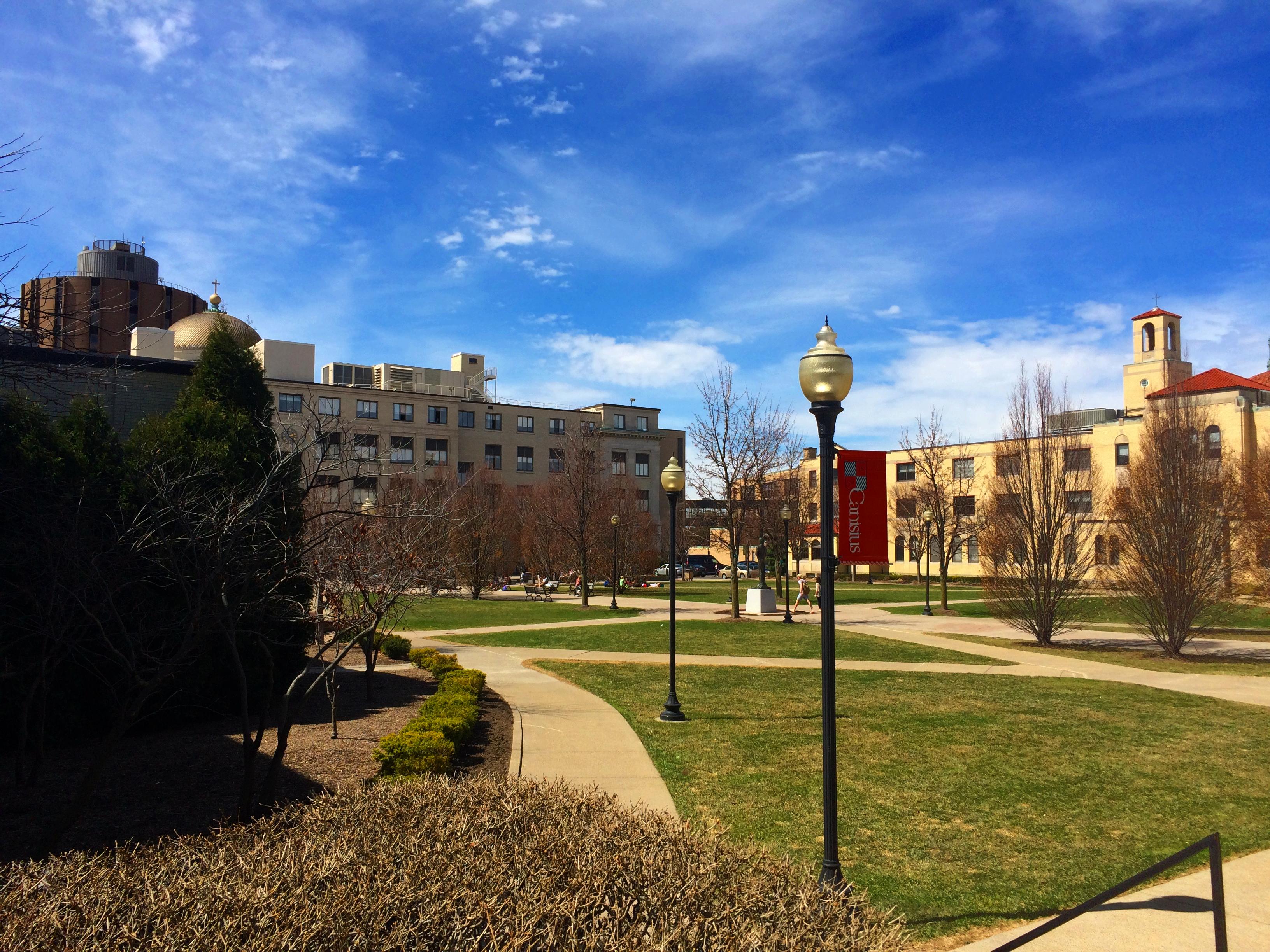Earning a Master's in Health Science guarantees students to not only increase the amount of both technical and clinical skills necessary in the field but to ensure that they'll have options for the careers they pursue post graduation. Those who receive an MHS with varying majors and specialization areas go onto work as athletic trainers, physical therapists, dentists, EMTs and paramedics, and so many more.
Many graduates from an MHS program will go onto doctoral programs or work toward medical degrees. The US Bureau of Labor Statistics found that jobs in Healthcare Occupations will increase an impressive 18 percent from 2016-2026. With population growth ever on the rise in conjunction with an aging population, the demand for those with competitive knowledge and skills in the field will be highly demanded for generations to come. Students graduate with an understanding of the various aspects of health science, including Biomechanics and Kinesiology. The average annual pay for someone with a Master's in Health Science will vary based off the many options they'll have for employment, but numbers vary from the mid $30,000s' to upward of $80,000. Deciding to earn a Master's in Health Science degree is a serious commitment to a rigorous course of study, but the decision and payoffs will be well worthwhile!
Ranking Methodology: "It's science!"
The researchers and writers at Best Master's Degrees don't make recommendations based upon preference– we back our rankings with numbers. Here's a quick breakdown of how we organize ranking data:
- Finances (40%)
- Academic Rigor (35%)
- Student Gratification (25%)
Nearly half of the data used to score each ranking involves finances and are acquired from sources such as the National Center for Education Statistics, the U.S. Department of Labor, U.S. Department of Education, Glassdoor, and PayScale. Financial data encompasses the cost of tuition, fees, and class supplied; the average price of living; access to financial aid and social services; and lastly, the projected annual salary acquired from degree outcomes and income for loan repayment. The second largest category of information involves the quality of education, how competitive degree applicants should be for consideration, and how exclusive a degree program is overall. The final 25 percent of collected data is dependent on student and alumni reviews from sources such as PayScale, Rate My Professor, and Students Review.
#20 — Otterbein University
Master of Allied Health
Westerville, OH
Website

Otterbein University is located in central Ohio, in the 36,000 populated-suburb of Westerville. Cincinnati is about two hours away, as is Lake Eerie. Columbus is a mere twenty minutes away.
Otterbein University's Master of Allied Health program is open to those who either have a two-year associate degree or a baccalaureate degree, so long as it was earned in a related health care field. Core courses in the program make up 15 credits, and all students will also complete a Thesis course or Advanced Clinical Practicum. The degree has two tracks of study: Exercise and Health Science, which is a total of 36 credits, or Health Administration, which is 30. Each track has its own set of prerequisites, in subjects such as statistics and general nutrition. Core courses, which will be taken regardless of track, include topics such as Evidence-based Practice, Leadership and Ethics, and Research Design. Allied Health is a broad program, intended for students who need further academic achievement in order to advance their careers. It will increase ones' skills in critical thinking, data collection and analysis, and use of technology.
Graduate Tuition/Fees: $24,402
Otterbein University is located in central Ohio, in the 36,000 populated-suburb of Westerville. Cincinnati is about two hours away, as is Lake Eerie. Columbus is a mere twenty minutes away.
#19 — Drexel University
Master of Health Administration
Philadelphia, PA
Website

Drexel has been continuously highly rated by graduates. Students have praised the university's co-op programs, which set students up with internship and professional experience. Many have spoken to how students at DU are dedicated, motivated, and focused on their studies.
The Master of Health Administration program from Drexel University is designed for students pursuing leadership or senior management in health services or systems, risk, insurance, compliance, research, or other related industries. Graduates will not only have the skills to succeed in leadership roles but also have foundational knowledge of the latest theories and contemporary practice applications. The program is a total of 45 credits, with a curriculum centered on fiscal accountability, implementing and managing chance, professional advocacy, and more. Faculty members not only have competitive experience in managed care, nonprofit organizations, and physician practice and management, but all have earned doctoral degrees. The MHA from Drexel will be completed online, with a five-day on-campus residency. Students have the option of competing in two or five years. It is preferred that applicants have a GPA of 3.3 or higher in undergraduate studies, but those with a lower GPA are still encouraged to apply. Applicants should also have at least three years of experience in health care management.
Graduate Tuition/Fees: $33,156
#18 — Canisius College
Master of Science in Health and Human Performance
Buffalo, NY
Website

Students who are attending Canisius from out-of-town may take all of the on-campus courses over the course of one semester, and then the rest online from their own homes.
Canisius College's Master of Science in Health and Human Performance is a hybrid-format 34 to 35 credit program, with courses offered online and some on-campus. The MS in Health and Human Performance is designed to prepare students for areas of rehabilitative and preventive health. Students in the program will have the choice between specializing in cardiac rehabilitation, health promotion, or strength and conditioning. Graduates will be prepared for careers in health-promotion programs, health care industries, clinical settings, and more. Those applying to the program should have at least an undergraduate GPA of 2.7, with relevant and sufficient coursework completed to fulfill prerequisites. Digital interviews with the program director or department representative are also required. Core courses, which make up for 19 of the 34-35 credits, include Nutrition, Epidemiology, Functional Conditions, Research Methods in Allied Health, and more. All students will complete an internship or a Master's Project, each accounting for six credits.
Graduate Tuition/Fees: $14,742
#17 — New Jersey City University
Master of Science in Health Sciences
Jersey City, NJ
Website

NJCU is only seven miles away from downtown New York City, located in easternmost New Jersey on the peninsula.
New Jersey City University's Master of Science in Health Sciences program is housed in the department of Graduate Health Administration. Upon graduation, students will be trained for professional careers in health care programs and agencies, hospital facilities, long-term care facilities, managed care organizations, and many more related industries. Virtual information sessions are available to students who would like further information on the program: they can register to attend these sessions at convenient times on the program's website. The program is a total of 38-45 credits that can be completed full or part-time, as many students who pursue the degree are already employed. Course courses include Managed Health Care, Health Law, Fiscal Management, and more. Students without two years of professional experience in the health field are required to complete a supervised field placement for 8-12 weeks.
Graduate Tuition/Fees: $10,490 / $18,486
#16 — Western Michigan University
Master of Public Health
Kalamazoo, MI
Website

WMU takes pride in its diverse student body, with 21 percent of their graduate students being apart of minority groups. It was the first known American university to require all of its students to study the non-Western world.
The Master of Public Health offered by Western Michigan University prepares students in five core areas of public health, designed for those already working in the field and who wish to to further their careers and impact on the future of public health. The core areas are Biostatistics, Environmental Health Sciences, Epidemiology, Health Services Administration, and Health Education and Health Behavior. The program is offered in hybrid-format with online courses and in-person courses at their campus in Grand Rapids, which is located three hours north of the main campus in Kalamazoo. New to the program is student participation in the Opioid Epidemic Summit and a symposium on leading public health issues in Michigan. Many students also complete a practicum with local and state-based organizations.
Graduate Tuition/Fees: $14,310 / $28,900
#15 — University of Arkansas at Little Rock
Master of Science in Health Education and Promotion
Little Rock, AR
Website

UA at Little Rock is located in central Arkansas, south of the Arkansas River and close by Boyle Park, which offers recreational activities like hiking. With a population of just under 200,000, downtown Little Rock is just ten minutes away.
The Master of Science in Health Education and Promotion from the University of Arkansas is for students in pursuit of careers as health service professionals, teachers, researches, corporate wellness/fitness coordinators, and sports/athletic management personnel. Applicants need to have at least a 3.0 GPA from baccalaureate studies and have scored at least in the 50th percentile for the GRE. The program is a total of 36 credits, made up of nine in core courses, 21 in Health Education and Promotion Requirements and six in a Thesis. There are no focus areas or specialized tracks. Course topics in the various sections of requirements include Theoretical Foundations of Health Education, Epidemiology, and Research Methods in Health Sciences. Those with prior and relevant education may transfer up to 12 credits into their course of study in the program, with department approval. All students prior to graduation will also have to complete a comprehensive exam.
Graduate Tuition/Fees: $7,680 / $17,400
#14 — Boise State University
Master of Health Science
Boise, ID
Website

BSU is located in the heart of Boise, right next to the Boise River. The urban location of the university places students only a mile away from the Boise Art Museum, Idaho Black History Museum, and more attractions.
The Master of Health Science program at Boise State University offers three different tracks housed under the MHS: Health Policy, Health Promotion, and Health Sciences Leadership. The core course that will be taken regardless of the chosen track account for 18 of the total 36-42 credits that a student may earn. Topics of the core curriculum include Ethics and Health Policy, Population Health and Delivery Systems, Research methods, and more. All students in the MHS program have the choice of completing a thesis, project, or further course work as an independent study, prior to graduation. The program is designed for those already working in the professional field, with convenient scheduling that won't interrupt employment. Even though it's housed in the College of Health Sciences, students in the MHS program will take courses with faculty members from many different programs across campus, including Economics, Kinesiology, and Nursing.
Graduate Tuition/Fees: $6,471 / $21,787
#13 — Florida Gulf Coast University
Master of Science in Health Science
City, ST
Website

Florida Gulf Coast University takes pride in the academic success of its dedicated students. 78% of classes are taught by full-time faculty, with classes having a 22:1 student-to-teacher ratio.
The Master of Science in Health Science from Florida Gulf Coast University is designed to prepare students for leadership and competitive professional roles in health care industries. The course is offered only entirely online, consisting of 36 total credits. Required core courses include Statistical Analysis and Legal & Ethic Aspect of Health Care. Electives, which account for 24 credits of the major, are divided into two main categories: health education and health administration. Health education is focused on the skills necessary for teaching students, clients, patients, and health care consumers. Those in the program will learn different deliveries of instruction for clinical sites and the classroom. The health administration courses are for those who would like specialized education in health services administration. Those who take this line of electives will learn practical managerial and organizational knowledge and skills.
Graduate Tuition/Fees: $6,974 / $28,170
#12 — The University of Texas at Tyler
Master of Science in Health Science
Tyler, TX
Website

UT Tyler is on the smaller end of public universities, with about 10,000 enrolled. Students who have attended enjoy the small-town feel of Tyler, as well as the smaller class sizes and the attentive professors.
The Master of Science in Health Sciences from The University of Texas prepares graduates for either professional careers in the field or doctoral pursuits. The program can be completed in just two years, with the majority of classes taking place in the evenings. Students in the program will choose from five focus areas: Health and Behavior, Global Health Issues, Community and Wellness, Risk Analysis and Health Promotion, and Program Development and Evaluation. Regardless of the chosen area, all will graduate with skills necessary for advocates of programs promoting sound health and disease prevention. All students will complete a master's thesis or internship prior to graduation. Research projects may also take place over the course of the two years, with opportunities to work side-by-side with faculty experts. The MS in Health Science at UT requires that applicants have at least a 3.0 GPA in all upper-division undergraduate hours, or already have a graduate degree. All applicants will also interview with at least one faculty member as well.
Graduate Tuition/Fees: $5,220 / $12,690
#11 — Utah State University
Master of Science in Health and Human Movement
Logan, UT
Website

Students who attend Utah State University can enjoy the many outdoor activities close by campus, including hiking into the beautiful Logan Canyon. Logan is located in northern Utah, close to the border of Idaho and 1.5 hours from Salt Lake City.
The Master of Science in Health and Human Movement from Utah State University is housed under the Kinesiology and Health Science department. It's a two-year program with no summer courses, allowing specialization in either Exercise Science or Sports Medicine. Graduates will benefit from not only in-depth studies of the discipline but research and practical experience during their time in the program. It's also foundational preparation for those pursuing Medical School, School of Dentistry, Physical Therapy, and more. Those who choose the Exercise Science pathway should have an undergraduate degree in a relevant discipline, but it's not necessary; those without a relevant degree should have at least prerequisite courses complete in Human Anatomy, Exercise Physiology, Biomechanics, and Anatomical Kinesiology. The Sports Medicine pathway requires students to have an undergraduate degree in Athletic Training, and either already be certified or be eligible for certification as an Athletic Trainer.
Graduate Tuition/Fees: $5,590 / $19,564
#10 — Northwestern University
Master of Science in Health Services and Outcomes Research
Evanston, IL
Website

Northwestern is a highly-acclaimed university in the Chicago area. Students have praised not only its athletics and student life but the academic programs and dedication of the faculty to student success.
Northwestern University's Master of Science in Health Services and Outcomes Research is designed for physicians and clinical health professionals for advanced careers in academic medicine. Those who are not clinicians may pursue employment in academia, health systems, research, and policy organizations. Students may complete the program at a full or part-time pace, and its hybrid-format allows students outside of Chicago to attend without issue. Full-time allows one to graduate in only a year, including summer courses. The program is a total of 10 required courses and one elective. Core topics include Quantitative Methods in Health Services and Outcomes Research, Intermediate Biostatistics, Health Economics, and Healthcare Financing. The curriculum provides a holistic and in-depth foundation of knowledge in the field.
Graduate Tuition/Fees: $52,239
#9 — University of Oklahoma-Health Sciences Center
Master of Public Health
Oklahoma City, OK
Website

The Health Sciences Center at OU houses about 4,000 students. The center is made up of nineteen buildings near the state capitol. There's a Children's Hospital, diabetes center, and cancer center.
The Master of Public Health from the University of Oklahoma at their Health Sciences Center is focused on all multidisciplinary aspects of the discourse. Students will choose from 10 different majors, including Health Promotion Science, Interdisciplinary Public Health, Health Administration and Policy, and more. Three dual-degree programs are also available: one with an MPH in Health Promotion Sciences and a Master of Social Work, MPH in Health Administration & Policy and medical degree (MD), and MPH in Health Administration & Policy and a Juris doctor. The traditional MPH, that do not lead to dual-degrees, are all at least 44 credit hours. The many options for the MPH degree speak to OU's impressive faculty in the College of Public Health, ensuring that regardless of the path chosen students will graduate with a multifaceted understanding of public health. Faculty members have earned their doctoral degrees, juris doctors, and Doctor of Osteopathic degrees.
Graduate Tuition/Fees: $5,119 / $19,778
#8 — Medical University of South Carolina
Master of Science in Biomedical Sciences
Charleston, SC
Website

MUSC is one of the earliest medical schools in the US, consisting of six colleges and a 700-bed medical center. Students have continuously praised the academic rigor.
The Master of Science in Biomedical Sciences from The Medical University of Southern Carolina is designed for those in pursuit of careers as research scientists, investigators, or teachers. It's a research-intense program, with a required independent laboratory research project. There are seven available specialization areas within the MS in Biomedical Sciences: Biochemistry & Molecular Biology, Biostatistics & Epidemiology, Microbiology & Immunology, Neurosciences, and more. Applicants should have at least an undergraduate GPA of 3.0, and GRE scores are not required but will be considered if submitted. Research experience is also desired but not required. Courses in the first year of the program are taken with Ph.D. students, adding to the academic dedication and motivation that is expected from students.
Graduate Tuition/Fees: $15,62 / $22,660
#7 — University of North Florida
Master of Science in Health in Exercise Science and Chronic Disease
Jacksonville, FL
Website

The University of North Florida Graduate School offers many scholarships and funding opportunities to students including research grants and fellowships. The College of Health offers many need-based scholarships and fellowships, separate from those offered from the greater Graduate School.
The Master of Science in Health from the University of North Florida offers a focus in Exercise Science and Chronic Disease. Students will learn from both an evidence-based curriculum and an applied research environment. The program consists of nine core courses, totaling 30 credits. The remaining 15 credits of the total 45 will be earned through electives and a six-credit internship, project, or thesis. Electives may include topics on strength and conditioning, pharmacology, and nutrition. Graduates will be prepared for professional work and leadership in health and fitness industries, preventive medicine, cardiopulmonary rehab, research, and more. When students choose to complete a thesis, they will conduct primary data collection on human subjects and secondary data analysis. Students will declare the thesis or non-thesis option once accepted. Applicants do not need to have a specific undergraduate major, but certain prerequisites are required.
Graduate Tuition/Fees: $8,978 / $20,517
#6 — University of Central Florida
Master of Health Administration
Orlando, FL
Website

UCF has the largest number of students enrolled than any other university in the US, with over 66,000 students. The research university takes up 1,415 acres, including an arboretum.
The Master of Health Administration program at the University of Central Florida gives students the option of two focus tracks: Health Services Administration and the Executive Health Services Administration. The Health Services Administration is the traditional program for those students entering without professional experience, while the Executive Health Services route is for professionals with at least three years experience in Health Management. The MHA can be completed online, but not all electives and prerequisites are offered online. Students should look into course offerings to see what would best fit their intentions, needs, and schedule. Applicants to the program will be required to choose a track, with each track potentially having different entry requirements; the EHS track requires an undergraduate GPA of at least 3.0, while the HSA track does not.
Graduate Tuition/Fees: $6,916 / $25,759
#5 — California State University-Dominguez Hills
Master of Science in Health Science, O & P Option
Carson, CA
Website

CSU at Dominguez Hills is an urban university in the South Bay area of Los Angeles. It serves a diverse student body of over 14,000. Most attend from in-state and are nontraditional students.
The Master of Science in Health Science from California State University's Dominguez Hills made the list with their Orthotics and Prosthetics program. It prepares students for a specialized health care profession, with both clinical and technical skills necessary for the holistic care of patients with neuromuscular and musculoskeletal disorders. Graduates will have learned principles in biomechanics, pathomechanics, gait analysis, kinesiology, anatomy, and more. To prepare for the necessary roles that someone in orthotics and prosthetics may perform, students will learn how to conduct an appropriate patient assessment, formulations, and implementations of treatment plans, follow-up treatment plans, and more. All will have to complete a series of exams and activities to fulfill the capstone. This may include a creative application of theory and practice with real clients.
Graduate Tuition/Fees: $7,176 / $16,680
#4 — University of Utah
Master of Science in Biomedical Informatics
Salt Lake City, UT
Website

University of Utah School of Medicine's bioinformatic informatics department was the first of its kind in the US. Faculty offer not only professional experience in the field but credentials proving the depth of their knowledge and experience.
The Master of Science in Biomedical Informatics from the University of Utah is designed for working professionals, biologists, and graduates in information technology and data science who are pursuing the advancement of their credentials. The three available tracks are Applied Clinical Informatics, Bioinformatics, and Data Science. The program is not research-oriented, and students who would prefer a research-intensive program are encouraged to look at the School of Medicine's Ph.D. programs. Students who are unsure about long-term career goals are more than welcome to begin the non-thesis route of the MS program, and after completing a portion of the program begin to consider an application to a Ph.D. program. Alumni of the informatics program are made up of over 375 graduates working around the globe. It is the largest informatics alumni network in the US.
Graduate Tuition/Fees: $6,725 / $23,740
#3 — Johns Hopkins University
Master of Health Science
Baltimore, MD
Website

Johns Hopkins University was the premier research university in the US, combining models of education that prioritized teaching and research. It has been a consistently top-rated university.
The Master of Health Science degree from Johns Hopkins University is offered in every department in their School of Public Health, allowing students to focus on subjects like Biochemistry and Molecular Biology, Biostatistics, Environmental Health, Mental Health, and many more. All programs, regardless of the home department, require four terms of full-time coursework and a capstone culminating one's studies. This capstone may be a thesis, essay, or oral presentation. Application requirements and guidelines vary by the home department of the chosen route for the MHS. The Master of Health Science housed by the Department of Population, Family and Reproductive Health, for example, requires an undergraduate GPA of at least 3.0 and at least one social science course, an upper-level math course, and a general biology course.
Graduate Tuition/Fees: $52,170
#2 — California State University-Long Beach
Master of Public Health
Long Beach, CA
Website

The Graduate School at CSU Long-Beach has a large enrollment of 6,000 students. The campus is known for its diversity, teaching students from more than 95 different countries. For a large public university, the student-to-faculty ratio is on the smaller side: 24:1.
California State University's Master of Public Health program at their Long Beach campus provides foundations for students to become competent professionals and leaders in community health education and public health. Values that guide the curriculum of the program include the collaboration between community, faculty, and students; equity among all peoples, who should be treated as individuals with an understanding of how diversity enriches public health; and more. The objectives of the program urge student achievement, rigorousness, and dedication, with goals set to maintain student evaluation averages above 4.00 each year. All students will graduate with skills in data analysis planning, disseminating research, providing expert assistance, formulating specific, measurable, and realistic objectives for programs, and more. Those interested in applying to the program are highly encouraged to speak with the Graduate Program Direction of the Health Science Graduate Program.
Graduate Tuition/Fees: $7,176 / $16,680
#1 — Duke University
Master of Science in Global Health
Durham, NC
Website

Although Duke isn't an Ivy League school, it has been a top-rated and competitive university for generations. It has campuses in Singapore and China! The main campus is located in northern-central North Carolina, next to its very own Duke Forest.
Duke University's Master of Science in Global Health program is a small and competitive program, requiring applicants to have taken the GRE General exam or the MCAT. The program only enrolls 30-35 students, with 50 faculty working closely to ensure a competitive education. Students must be enrolled full-time. The program is designed for those already in professional careers who wish to further their credentials in the master's program or Duke medical students. It's a total of 38 credits, focused on key global health concepts, core methodologies used in research, ethics and culturally-responsive action training, and foundational knowledge for the evaluation and understanding of health systems. All students in the program will dedicate at least ten weeks to a closely-mentored and field-based research project, leading to a thesis. There is funding available for travel and expenses of these projects.